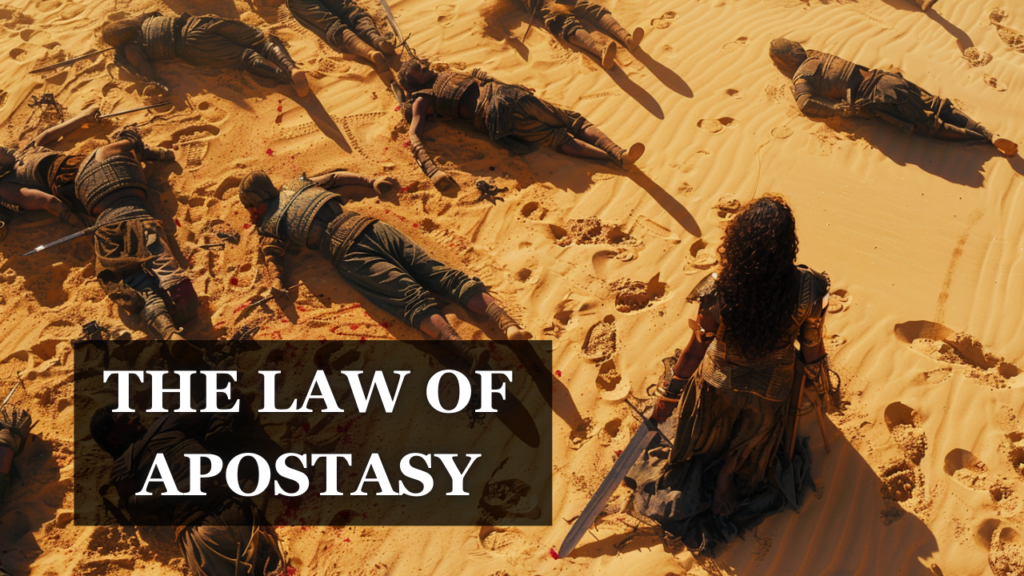Cringe video Refutation is Based On:
Points & Refutations:
- If you reject Hadith you are a kafir
Thank God. To disbelieve in such idol worship is a blessing.
- How would you know or prove the Quran is preserved? No evidence w/o hadith
[15:9] Absolutely, we have revealed the reminder, and, absolutely, we will preserve it.*
[85:21-22] Indeed, it is a glorious Quran. In a preserved master tablet.
- How would you know/prove the Quran was revealed to Muhammad? (lol)
[3:144] Muhammad was no more than a messenger like the messengers before him. Should he die or get killed, would you turn back on your heels? Anyone who turns back on his heels, does not hurt GOD in the least. GOD rewards those who are appreciative.
[33:40] Muhammad was not the father of any man among you. He was a messenger of GOD and the final prophet. GOD is fully aware of all things.
[2:97] Say, “Anyone who opposes Gabriel should know that he has brought down this (Quran) into your heart, in accordance with GOD’s will, confirming previous scriptures, and providing guidance and good news for the believers.”
[17:36] You shall not accept any information, unless you verify it for yourself. I have given you the hearing, the eyesight, and the brain, and you are responsible for using them.
If we use our brains (17:36), we know that Muhammad was a messenger like those before him (3:144). The Quran confirms that he was the final prophet (33:40), and it explicitly states that the revelation was brought to his heart by Gabriel in accordance with God’s will (2:97). Thus, if we verify the information as commanded in 17:36, we find that the Quran itself provides evidence that it was revealed to Muhammad through Gabriel. Rejecting this without reason would be going against the very principle of verification and critical thinking that God commands in 17:36. Arguing that you can only know this through hadith contradicts 17:36, which commands us to verify information for ourselves. The Quran itself provides direct testimony that it was revealed to Muhammad through Gabriel.
- You would not know anything about Muhammad (no sirah or hadith)
The Quran itself provides clear information about his role, mission, and character. It confirms that Muhammad was a messenger of God (3:144) and offers guidance on how to follow his example (24:54). It also references significant events and challenges he faced, providing context for his life and mission. Iit emphasizes his noble character (68:4) and his purpose as a mercy to humanity (21:107).
[60:4] A good example has been set for you by Abraham and those with him. They said to their people, “We disown you and the idols that you worship besides GOD. We denounce you, and you will see nothing from us except animosity and hatred until you believe in GOD ALONE.” However, a mistake was committed by Abraham when he said to his father, “I will pray for your forgiveness, but I possess no power to protect you from GOD.” “Our Lord, we trust in You, and submit to You; to You is the final destiny.
Where is Abraham’s example? The obvious answer is that it is in the Quran. The same goes for Muhammad’s example.
- How to pray/fast/hajj/what it means, conditions of fasting, details of hajj,
How does any person who believes in the Quran know how to pray? They learn from their parents or local imams, who learned from their parents and so on. It’s a physical communal practice. The act of prayer itself, its movements, and its recitations are part of the living tradition, passed down through generations. The rites and rituals of our religion all come from Abraham, and Muhammad was commanded to follow the religion of Abraham (milat Ibrahim). The word milat ( مِلَّةَ ) comes from the root which means to dictate but also signifies the specific religious practices of Abraham. So this expression, milat Ibrahim ( مِلَّةَ إِبْرَاهِيمَ ), can be understood as the religious practices dictated through Abraham.
[2:130] Who would forsake the religion of Abraham (milat Ibrahim), except one who fools his own soul? We have chosen him in this world, and in the Hereafter he will be with the righteous.
[16:123] Then we inspired you (Muhammad) to follow the religion of Abraham (milat Ibrahim), the monotheist; he never was an idol worshiper.
[6:161] Say, “My Lord has guided me in a straight path—the perfect religion of Abraham (milat Ibrahim), monotheism. He never was an idol worshiper.” [6:162] Say, “My Contact Prayers (Salat), my worship practices, my life and my death, are all devoted absolutely to GOD alone, the Lord of the universe.
Prayer came from Abraham, and then was passed down to Ishmael, then generationally until it reached Muhammad’s era, in which he purified it using the Quran (like in 17:110, where it commands to recite in a moderate tone).
Islam is called “Millat Ibrahim” (The Religion of Abraham) throughout the Quran (2:130, 135; 3:95; 4:125; 6:161; 12:37-38; 16:123; 21:73; 22:78). Moreover, the Quran informs us that Muhammad was a follower of Abraham (16:123). Due to a general unawareness of the fact that Abraham was the original messenger of Islam (Submission), many so-called Muslims challenge God: “If the Quran is complete and fully detailed (as claimed by God), where can we find the number of Rak`ahs (units) in each contact prayer (Salat)?” We learn from the Quran that all religious practices of Islam were already established before the Quran’s revelation (8:35, 9:54, 16:123, 21:73, 22:27, 28:27). Verse 16:123 is direct proof that all religious practices in Islam were intact when Muhammad was born. Muhammad was enjoined to “follow the religion of Abraham.” If I ask you to buy a color TV, it is assumed that you know what a color TV is. Similarly, when God enjoined Muhammad to follow the practices of Abraham (16:123), such practices must have been well known. Another proof of divine preservation of the Islamic practices given to Abraham is the “Universal Acceptance” of such practices. There is no dispute concerning the number of Rak`ahs in all five daily prayers. This proves the divine preservation of Salat.
The Quran deals only with practices that were distorted. For example, the distorted ablution is restored in 5:6 to its original four steps. The tone of voice during the contact prayers (Salat) was distorted – many Muslims pray silently. This was corrected in the Quran, 17:110. The fasting during Ramadan was modified in the Quran to allow intercourse during the night (2:187). Zakat is restored in 6:141, and Hajj is restored to the four correct months (see Appendix 15).
- Rejecting Quran because you reject qiraat since it comes from hadith (maliki/maaliki), hadith rejector can’t explain qiraat.
Sunnis lost the Quran. The cope is that the Quran is multi-formic and that all 28 authorized recitations of the Quran are valid, but this is not true. There’s only one that is purified by Code 19, as Chapter 74 states would occur.
- If you say 1 wrong/1 right, then you reject the Quran
Another false dichotomy. Sunni transmitters admit to altering the Quran:
“ʾAkūna (Q63:10) There is another place where ʾAbū ʿAmr ignores the rasm to arrive at a grammatically more typical reading, namely in Q63:10b بيرقلجاىلاىنترخاالولبرلوقيف نيحلصلانمنكاوقدصاف” so that he says: My Lord, if only you would reprieve me for a little while, so that I would give alms and be among the righteous.” All readers except for ʾAbū ʿAmr read this as: fa-yaqūla: rabbi lawlā ʾaḫḫartanī ʾilā ʾaǧlin qarībin fa-ʾaṣṣaddaqa wa-ʾakun mina ṣ-ṣāliḥīna, with ʾakun ‘I would be’ in the apocopate.” – ibn al-Ǧazarī, Našr, §4401.
Your alleged transmitters of Quran have some of the most disgusting accusations made against them from their own co-proto-sunnis:
AL-KISA’I
TRANSMITTER OF QIRA’AT (__ AN AL-KISA’I)
IBN AL-ARĀBĪ PRAISED AL-KISĀ’Ī’S KNOWLEDGE AND SAID: HE WAS THE MOST KNOWLEDGEABLE OF PEOPLE, DESPITE BEING A LIAR/IMPUDENT (RAHAQ). HE USED TO CONSUME ALCOHOL AND ACCOMPANY YOUNG BEAUTIFUL BOYS, YET HE WAS A GREAT QUR’ĀN RECITER. IT WAS RELATED THAT ONE DAY HE LED SOME PEOPLE IN PRAYERS AND RECITED USING HAMZA’S SYSTEM OF RECITATION. AFTER HE FINISHED THE PRAYER, THE PEOPLE IN THE MOSQUE BEAT HIM UP WITH THEIR FISTS AND SHOES. WHEN ASKED WHY, HE REPLIED THAT IT WAS BECAUSE OF THE DECADENT/LOWLY READING OF HAMZA (QIRĀ’AT HAMZA AL-RADĪ’A).
ABŪ ‘ABD ALLĀH YAQŪT AL-ḤAMAWĪ (D. 626/1229), MU‘JAM AL-UDABĀ’, ED. IḤSĀN ‘ABBĀS, 7 VOLS. (BEIRUT: DĀR AL-GHARB AL-ISLĀMĪ, 1993), 4:1740-1.
QALUN
TRANSMITTER OF QIRA’AT (QALUN AN NAFI)
HE WAS TRUSTWORTHY IN QIRĀ’A, BUT NOT VERY MUCH IN HADĪTH. AHMAD B. SĀLIH WAS ASKED ABOUT QĀLŪN’S TRUSTWORTHINESS IN HADĪTH;
HE LAUGHED AND SAID: “DO YOU WRITE DOWN HADĪTH FROM ANYONE? QĀLŪN WAS DEAF, BUT HE WAS ABLE TO READ PEOPLE’S LIPS AND CORRECT THEIR MISTAKES”
IBN HAJAR, LISĀN, 6:286-7.
(this guy can’t even hear the recitation of Quran yet we’re supposed to accept the recitation of a lip-reader?
HAFS
TRANSMITTER OF QIRA’AT (HAFS AN ASIM)
AHMAD B. HANBAL SAID THAT HIS HADĪTH WAS NOT TO BE TRANSMITTED. IBN MA‘ĪN STATED HE WAS NOT TRUSTWORTHY, WHILE AL-MADĪNĪ SAID THAT HIS HADĪTH WAS WEAK AND SHOULD BE ABANDONED. AL-BUKHĀRĪ SAID THAT THE HADĪTH TRANSMITTERS ABANDONED HAFS’S HADĪTH (TARAKŪHU), AND AL-NASĀ’Ī CONFIRMED THAT HIS HADĪTH MUST NEITHER BE LEARNED NOR WRITTEN DOWN.
IBN HIBBĀN SAID THAT HE USED TO FORGE AND FABRICATE ISNĀDS. ‘ABD AL-RAḤMĀN B. MAHDĪ STATED THAT IT WAS NOT PERMISSIBLE TO TRANSMIT HADĪTH FROM HIM (MĀ TAḤILL AL-RIWĀYA‘ANHU).
IBN HAJAR, TAHDHĪB AL-TAHDHĪB, 2:450-1.
(this guy can’t even reach the standard to be a hadith transmitter – yet can transmit the Quran??)
QUNBUL
TRANSMITTER OF QIRA’AT (QUNBUL AN IBN KATHIR)
HE BECAME CHIEF OF THE POLICE (SHURṬA) IN MAKKA BUT GREW CORRUPT (KHARUBAT SĪRATUHU). HE LIVED LONG AND BECAME SENILE. HE STOPPED TEACHING THE QUR’ĀN SEVEN YEARS BEFORE HIS DEATH. IBN AL-MUNĀDĪ NARRATED THAT HE PERFORMED PILGRIMAGE TOGETHER WITH IBN MUJĀHID AND IBN SHANABŪDH.
WHEN THEY MET QUNBUL IN MAKKA HE WAS MENTALLY UNSTABLE. IBN MUJĀHID STARTED A QUR’ĀN AUDITION WITH HIM, BUT QUNBUL WAS MAKING SO MANY MISTAKES IN HIS RECITATION THAT IBN MUJĀHID WAS FORCED TO LEAVE THE SESSION.
LISĀN AL-MĪZĀN, ED. ‘ABD AL-FATTĀḤ ABŪ GHUDDA AND SALMĀN ‘ABD AL-FATTĀḤ ABŪ GHUDDA, 10 VOLS. (BEIRUT: DĀR AL-BASHĀ’IR AL-ISLĀMIYYA, 2002), 7:284-5.
(Even Ibn Mujahid, the guy who formed the 7 qiraat, couldn’t bear to listen to this guy – yet he’s one of the recitations of the Quran?)
HISHAM B. AMMAR
TRANSMITTER OF QIRA’AT (HISHAM AN IBN AMIR)
HE WOULD REPEAT AND TRANSMIT ANYTHING PEOPLE TOLD HIM WITHOUT INQUIRING ABOUT ITS TRUTH, BUT HE WAS MORE TRUSTWORTHY WHEN HE WAS YOUNGER. HISHĀM TRANSMITTED 400 BASELESS HADĪTHS (LAYSA LAHĀ AṢL) ALL WITH [APPARENTLY] GOOD ISNĀDS.
ONE DAY, HE WAS SITTING IN PUBLIC WHILE HIS PRIVATE PARTS WERE VISIBLE. A MAN TOLD HIM: “COVER YOURSELF!” HISHĀM RESPONDED: “HAVE YOU SEEN IT [I.E., MY PENIS]? GOD WILLING YOUR EYES WILL NEVER SUFFER FROM RAMAD (OPHTHALMIA).” IBN HANBAL PURPORTEDLY SAID: “ONE MUST REPEAT THE PRAYER IF IT WAS LED BY HISHĀM.”
MIZZĪ, TAHDHĪB AL-KAMĀL, 30:242-55; IBN HAJAR, TAHDHĪB AL-TAHDHĪB, 4:276-7.
(Light takfir by Ibn Hanbal towards the end, lol – Hisham also had his junk out in the open – noble for a qiraat transmitter)

Tabari rejected a verse of Ibn Kathir, and insulted the holy reading of Ibn Amir, according to Sunni logic, shouldn’t he be a kafir? Or is he excused because your religion is built upon him and without the ‘kafir’ you have so much to lose?
What gives Ibn Mujahid the right to limit the qiraat to 7? Who gave him ijtihad? God?
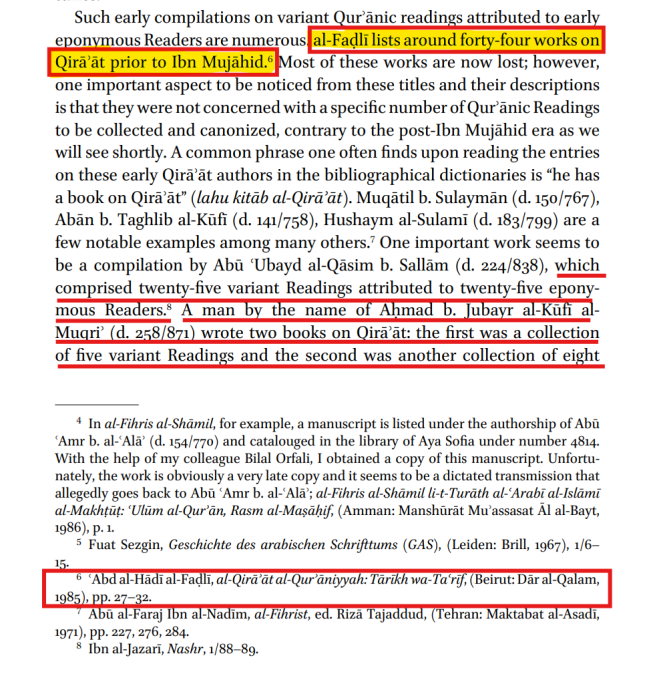
- If you accept all qiraat, why? You’re relying on hadith
They are all rejected. Code 19 proves the Quran.
- If you say one is distorted, then you reject the Quran and God’s statement of 15:9
They’re all distorted to differing degrees. 2:184 contains differing laws depending on if you are reading Hafs or Warsh:
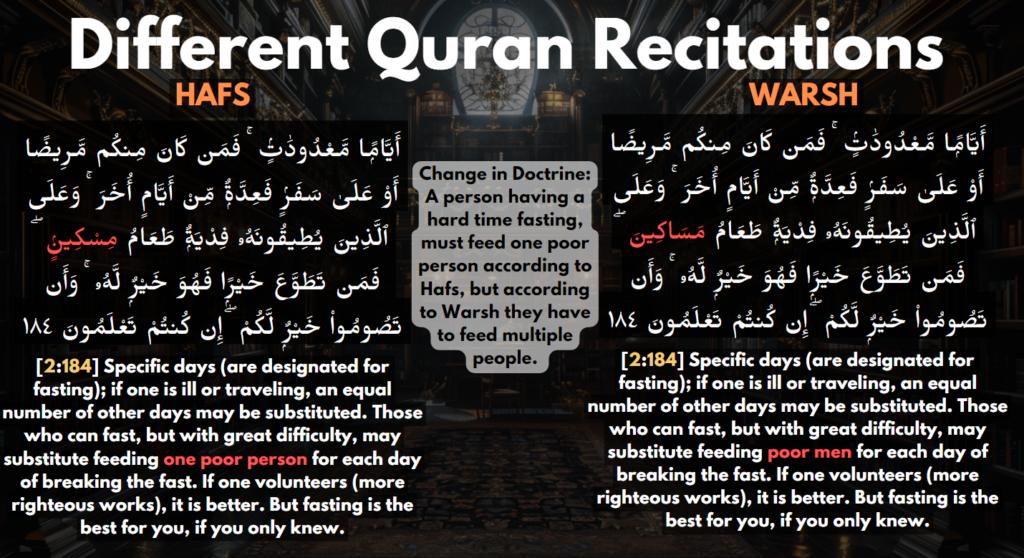
“This example here shows a major deviation in religious requirements. What are we supposed to do if we are ill and cannot make up the missed days of fasting? According to the Hafs version of the Quran, the minimum requirement is that we must feed one poor person each day of breaking the fast, and we may volunteer more if we choose. According to the Warsh version, the minimum requirement is that we must feed more than one poor person each day of breaking the fast, and we may volunteer more if we choose. So which is it? It’s a clear contradiction between the Quranic versions, and both of them cannot be true at the same time!”
- You can answer based on ahruf if you accept hadith, but can’t if you reject hadith.
This one is funny considering Sunnis have no clue what a harf is, let alone ahruf. Suyuti has cited forty different interpretations of it in his treatise Al-Itqan fi ‘Ulumi’l-Qur’an.
Abū Shāmah has said, “Some have imagined that the ‘seven harfs’ mentioned in the tradition refers to the seven readings – a notion which is prevalent even up to now. This is while this notion is contrary to the consensus of all the people of knowledge, and it has been discussed only by some ignoramuses.” (Al-Itqān, vol. 1, p. 80)
The Quran always refers to itself in the singular form ( الْقُرْآن ) and never in the plural form ( القرآنون or القرآنين ). This indicates that there is only a single Quran “Recitation” that is authorized by God, which is in the preserved master tablet (lawḥin maḥfūẓin)
[20:4] A revelation from the Creator of the earth and the high heavens.
- Ignoring ijma and consensus of ulema
[19:73] When our revelations are recited to them, clearly, those who disbelieve say to those who believe, “Which of us is more prosperous? Which of us is in the majority?”
Same excuse the Rabbis, Pharisees, & Sadducees gave when Jesus proclaimed to be the Messiah. Ijma of the Ulema of that time was to reject him & crucify his body.
[5:70] We have taken a covenant from the Children of Israel, and we sent to them messengers. Whenever a messenger went to them with anything they disliked, some of them they rejected, and some they killed.
[6:116] If you obey the majority of people on earth, they will divert you from the path of GOD. They follow only conjecture; they only guess.
- Rejecting hadith is not valid
Tell that to Muhammad in your own hadith:
Narrated `Aisha: Allah’s Messenger (ﷺ) came to me and I told him about the slave-girl (Barirah) Allah’s Messenger (ﷺ) said, “Buy and manumit her, for the Wala is for the one who manumits.” In the evening the Prophet (ﷺ) got up and glorified Allah as He deserved and then said, “Why do some people impose conditions which are not present in Allah’s Book (Laws)? Whoever imposes such a condition as is not in Allah’s Laws, then that condition is invalid even if he imposes one hundred conditions, for Allah’s conditions are more binding and reliable.“ Sahih al-Bukhari 2155
Narrated Ash-Shubi: I heard Abu Juhaifa saying, “I asked Ali ‘Is there anything that is not in the Quran?‘ {Once he said, what is not with the people?} Ali replied, ‘By Him Who made the grain split (germinate) and created the soul, we have nothing except what is in the Qur’an. …” Sahih al-Bukhari 6903
- No scholar takes Hadith Rejection seriously
Not an argument. Just shows you worship your own scholars that differ in the validity of Quran recitations being valid, differ in hadith gradings, differ on if istigatha is permissible, shirk, or haram, etc etc etc
- Hadith rejectors are not mujtahids and don’t know Arabic
This Sunni needs to do more reading, plenty of hadith rejectors in/come from the arab world who realize the inconsistency and condemnation of hadith.

- Hadith Rejectors don’t know sirah, asbaab an nuzool, etc etc
The Hadith can’t even tell us how long the prophet stayed in Mecca without having Ibn Abbas (allegedly) give several different years, yet it’s valid enough to tell us information about the Quran?:
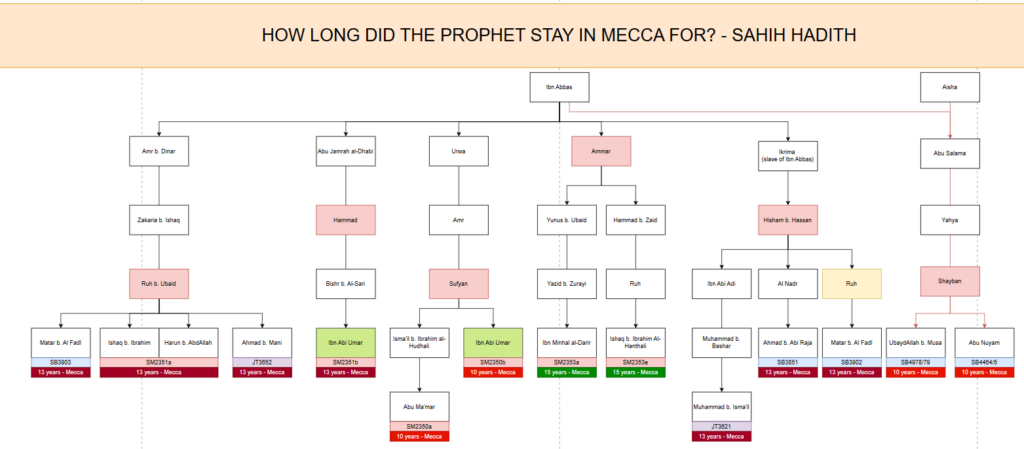
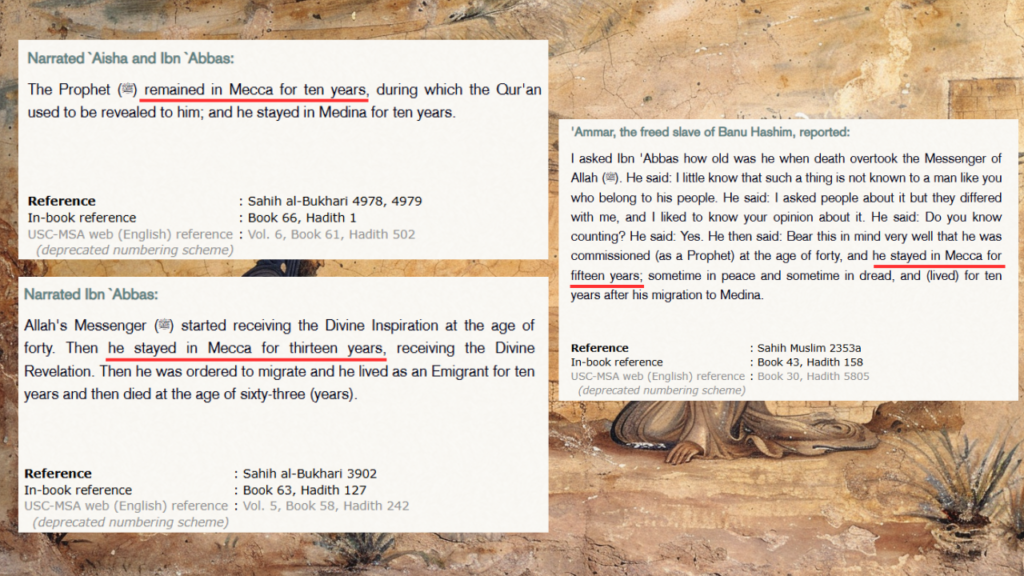
- None of the companions of the prophet followed Islam correctly?
The argument that “none of the companions of the Prophet followed Islam correctly” presupposes that the hadith corpus reliably and accurately traces back to the companions. This assumption commits the fallacy of begging the question, it assumes as true the very thing that needs to be proven. The reliability of hadith transmission is not a given but a matter of historical scrutiny, and asserting that the companions collectively failed presupposes that we have an unimpeachable record of their actions, which is precisely what’s in question.
[9:101] Among the Arabs around you, there are hypocrites. Also, among the city dwellers, there are those who are accustomed to hypocrisy. You do not know them, but we know them. We will double the retribution for them, then they end up committed to a terrible retribution.
This verse makes it clear that even the Prophet himself did not have full knowledge of the hypocrites among his companions. Yet, remarkably, later hadith scholars—centuries removed from the time of the Prophet—possessed the ability to assess and categorize the companions with certainty?
[63:1] When the hypocrites come to you they say, “We bear witness that you are the messenger of GOD.”* GOD knows that you are His messenger, and GOD bears witness that the hypocrites are liars.
People around the Prophet appeared to be believers, but in reality, they were liars. This contradicts the idea that later scholars could fully trust all companions’ words and actions. If hypocrisy was so deeply embedded, how can we be sure that hadith collections reliably represent the truth?
- 16:89 – cope: explains all things in a general sense, not literally everything – why doesn’t Quran explain blueprints of rocketship?
The claim that “the Qur’an doesn’t explain how to build a rocket” is a strawman argument because no religious scripture is meant to serve as an engineering manual. The Qur’an explains everything necessary for religious life—how to worship, what is lawful and unlawful, how to attain salvation, and how to live a moral and just life. This is the only “everything” that matters in the context of divine guidance.
- Ibn Kathir adds sunnah in tafsir of 16:89
Of course, Ibn Kathir would artificially insert the Sunnah into his tafsir of Surah An-Nahl (16:89)—his entire scholarly project was based on validating and transmitting the hadith corpus, a system built on layers of fabrication, contradiction, and political influences. His methodology was to force hadith-based interpretations onto it, even when the text itself did not warrant such an addition.
- In order to be a muslim you must submit, rejecting hadith of the prophet is not submitting.
This argument commits the fallacy of false presupposition, assuming without proof that hadith reliably trace back to the Prophet. The entire hadith system is based on blindly trusting narrator chains, yet these narrators are only known through biographies written by other hadith transmitters, creating an endless loop of self-validation. This is pure conjecture, which the Qur’an condemns (6:116, 10:36). True Submission is to God alone through His fully detailed Book (6:114), not fabricated reports compiled centuries later.
- They ignore clear Quranic commands to obey both God and the Messenger (Surah 3:31-32, 4:59) How can you refer a dispute back to the messenger if you reject all of his ahadith?
The argument that obeying the Messenger requires following hadith commits the fallacy of false presupposition, assuming that hadith reliably trace back to the Prophet. The Qur’an itself defines obedience to the Messenger as obeying his message, which is the Qur’an alone (16:82, 5:99). The Qur’an repeatedly emphasizes that the Prophet’s sole duty was to deliver the message (5:92, 24:54), and on the Day of Judgment, he will testify that his people abandoned the Qur’an (25:30). Furthermore, if referring disputes back to the Messenger meant hadith, then how could people during his lifetime do so when hadith were not yet compiled? The Qur’an contains all necessary guidance (16:89), and the only Hadith to be followed is the Qur’an itself (77:50).
- According to Ibn Kathir and the Salaf, referring disputes to “God and the Messenger” means referring to both Quran and Sunnah
Of course, Ibn Kathir and the Salaf presuppose the validity of hadith, so they naturally interpret “God and the Messenger” as referring to both the Qur’an and Sunnah. However, this is circular reasoning—they assume hadith are valid and then use that assumption to justify hadith. The Qur’an itself never mentions the Sunnah as a second source of law, only the Qur’an as the sole guidance (16:89, 6:114). The command to refer disputes to “God and the Messenger” (4:59) meant referring to the Prophet during his lifetime, and after his death, only his preserved message—the Qur’an—remains (5:99, 21:10).
- Rejecting hadith makes one a kafir (disbeliever) by consensus (ijma’) of scholars, companions, and pious generations – this is not a minority opinion but a millennium-old scholarly consensus
The claim that rejecting hadith makes one a kafir by consensus assumes that so-called scholarly ijma’ is infallible, yet the Qur’an repeatedly shows that past scholars rejected prophets and misled their people. The scholars of Noah (71:24), Moses (10:78), and Jesus (5:110) all opposed their respective messengers, proving that merely following the consensus of scholars would have led to rejecting divine truth. Furthermore, the Qur’an warns against blindly following the majority:
[6:116] If you obey the majority of people on earth, they will divert you from the path of GOD. They follow only conjecture; they only guess.
[19:73] When our revelations are recited to them, clearly, those who disbelieve say to those who believe, “Which of us is more prosperous? Which of us is in the majority?”
1,400 years of scholarship does not make something true. You can have 1,400 years of scholarship built upon junk, the length of the scholarship doesn’t render it great. If appealing to long-standing tradition were valid, then rejecting 2000 years of Christian doctrine or millennia of Jewish scholarship would be equally absurd. What matters is not how old or widely accepted something is, but whether it aligns with the Qur’an (6:114).
